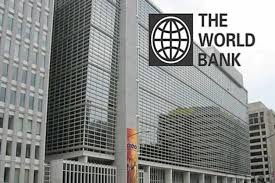
W/Bank Withholds $1.5bn Loan To Nigeria
Nigeria got a caveat on Thursday to get approval for a $1.5 billion loan she is seeking from the World Bank. The reforms around the naira must be strengthened by the Federal Government, the financial institution is insisting.
According to a Reuters news agency report, World Bank Country Director in Nigeria Shubham Chaudhuri gave the condition in Abuja at the launch of the latest World Bank Nigeria Development Update (NDU).
Mr. Shubham said the $1.5 billion loan request would be tabled next week before the World Bank Board for approval.
Nigeria is requesting for the $1.5 billion facility to mitigate the impact of low oil prices and the decimation of the economy by the corona virus pandemic.
For any country to access World Bank loan, a number of conditions are usually given. In the case of Nigeria, the World Bank is demanding a set of reforms.
These reforms include: unification of the naira and removal of fuel subsidy as conditions to be met before Nigeria can access the$1.5 billion facility.
By withholding the $1.5 billion loan, Nigeria will be confronted with a huge revenue gap that would make it difficult to finance the revised ?10.8 trillion 2020 national budget.
In recent weeks, the value of the naira has come under pressure because of dollar scarcity.
Shubham said: “We recognise how much Nigeria has done. There needs to be a little bit more. The outset of the COVID-19 crisis has made the task much more challenging and urgent because of the severity of the economic downturn and the decline in fiscal resources.
“By 2023, in our baseline scenario, Nigeria’s GDP per capita is expected to be roughly similar to that of 2010. This means that Nigeria would lose 14 years in per capita incomes.
“By contrast, if we compare Nigeria with the average of middle-income economies worldwide, we find that other countries are expected to lose around 7 years.
“In other words, while COVID-19 will hit incomes across all countries, Nigeria is expected to suffer twice as much.
“Because Nigeria’s growth has been uneven and volatile, once we adjust for inflation, we find that for Nigeria going back to 2010 is equivalent to going back to the 1980s.”
The World Bank Country director further explained that “before COVID-19, rising food prices were already putting pressure on inflation due to insecurity in the North, conflicts between farmers and herders in the middle belt, and Nigeria’s closure of land borders since August 2019. Then, on top of these, pandemic related disruptions in value chains and production processes further increased inflation.”
In a statement issued after the NDU release, the World Bank raised the alarm that despite the current recession, Nigeria risks sinking deeper into recession in the next three years.
The statement reads: “In the next three years, an average Nigerian could see a reversal of decades of economic growth and the country could enter its deepest recession since the 1980s.
“In the absence of measures to mitigate the impact of the COVID-19 crisis, the number of poor could increase by 15 to 20 million by 2022.”
The report, however, advised that “this path could be avoided, if progress in the current reforms is sustained and the right mix of policy measures is implemented.
“It takes stock of the recently implemented reforms and proposes policy options to mitigate the impact of COVID-19 and foster a resilient, sustainable, and inclusive recovery.
The latest World Bank NDU projects that the economy could shrink up to four per cent this year, following the twin shocks of COVID-19 and low oil prices.
The pace of recovery next year and beyond, the NDU release said “remains highly uncertain and subject to the pace of reforms.”
The World Bank director went further: “Nigeria is at a critical historical juncture, with a choice to make. Nigeria can choose to break decisively from business-as-usual, and rise to its considerable potential by sustaining the bold reforms that have been taken thus far and going even further and with an even greater sense of urgency to promote faster and more inclusive economic growth.”
The NDU acknowledged the measures taken by the government since April, including the efforts to harmonise exchange rates, introduce a market-based pricing mechanism for petrol, adjust electricity tariffs to more cost-reflective levels, reduce non-essential expenditures and redirect resources towards the COVID-19 response.”
The NDU report also highlighted the transparency in the oil and gas sector and public debt as essential steps for a resilient recovery.
World Bank Lead Economist for Nigeria and co-author of the report Marco Hernandez also said: “Nigeria can build on its reform momentum to contain the spread of COVID-19, stimulate the economy, and enable the private sector to be the engine of growth and job creation.
“It can also redirect public spending from subsidies that benefit the rich towards investments in Nigeria’s people and youth in particular, and lay foundations for a strong recovery to help make progress towards lifting 100 million people out of poverty.”
Looking ahead, the NDU pointed out five areas that would help mitigate the effects of the crisis and support Nigeria’s recovery.
They include: managing the domestic spread of COVID-19 until a vaccine is available for distribution; enhancing macroeconomic management to boost investor confidence; safeguarding and mobilising revenues; reprioritising public spending to protect critical development expenditures; and supporting economic activity and access to basic services and providing relief for poor and vulnerable communities.
